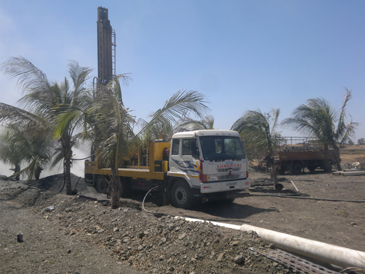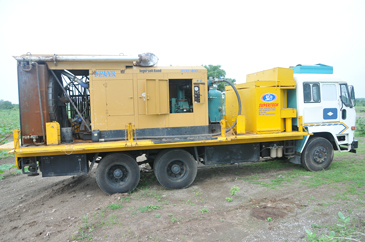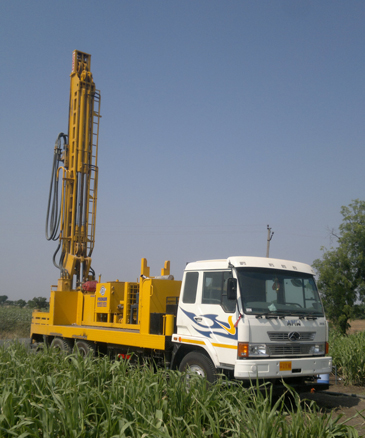
The Godavari Tubewell Drilling Company borewell unit, with Ingersoll Rand air compressor powered by a Volvo Penta D16 engine, is shown in action in Western India.
With the need for private water wells making air compressor-powered borewell operations more and more vital in western India, Volvo Penta has begun making inroads into a challenging market.
Western India has been in the throes of a devastating drought for the past two years. Between below-average monsoon rainfall and inefficiencies in water management, millions of people in the region are without adequate access to drinking water. And the lack of water is having a dangerous domino effect: the state of Maharashtra, which has been one of the areas hardest hit by the drought, is covered with farmland that most of the nation ordinarily relies upon for its soybeans and legumes.
Under these potentially dire circumstances, the more than 4,300 well drillers around the country are in high demand to dig private wells. Godavari Tubewell Drilling Company, in Rajkot, India, is just one such operation. The company has worked for 30 years in the western region of India — in the states of Maharashtra, Gujarat, Rajasthan and Madhya Pradesh — where conditions are hot and dusty. It currently operates 20 air compressor-driven borewell machines that are used to drill into the ground with a drill bit and hammer — sometimes reaching a depth of more than 814 meters (2,670 feet).
Digging deep
Even though Volvo Penta has been in the country longer than any other Volvo Group business area and is strong overall in gensets and versatile industrial engines, as well as in the marine segment, it has yet to gain a foothold in India’s air compressor segment. That is largely because the company didn’t, until recently, have an engine offering well suited to air compressors. But now with the D13 and D16 ranges with heavy-duty packages for cooling and air filtration, there is a new opportunity for Volvo Penta to make inroads in the air compressor market in India.
For OEMs, total cost of ownership is highly important. But now Volvo Penta is strategically targeting end users, too, trying to persuade them that changing their air compressors' engines would drastically lower their total cost of ownership.

The Volvo Penta D16 engine is seen in Godavari’s Ingersoll Rand 1400/350 air compressor.
Sourcing water, saving fuel
Volvo Penta dealer SeaTech approached Godavari Tubewell Drilling Company about replacing the engine in a 1400 CFM/350 PSI Ingersoll Rand air compressor in one of its borewell machines with a Volvo Penta D16 engine. Godavari agreed, and after 1,600 hours on the job, the engine was performing so well that the company has installed another machine with an engine with an even higher power rating — a TAD1642VE. It is also testing a D13 in a 1300 CFM/350 PSI compressor.
Godavari, one of the biggest well drill companies in western India, reported saving seven to 10 liters of fuel per hour — 10 to 15% savings overall and around $17,000 per machine for 3,000 hours of operation — in addition to longer maintenance intervals, lower oil consumption, and reduced noise levels and emissions. Godavari also found service and installation easier with Volvo Penta than with the previous brand.

“Even during deep drilling operations, there is no drop in RPM, and we get better performance than we did with our previous engine,” says Mansukh Pansuriya, managing director of Godavari Tubewell Drilling Company. “We’ve been given good support by Volvo Penta and SeaTech, which has helped us to repower more machines.”
Godavari hasn’t been shy about touting the benefits of the D16 engine, and a number of companies are sitting up and taking notice. “With the prices of diesel going up every day, there’s a good future for Volvo Penta engines in India,” Pansuriya says.
Source: AB Volvo Penta
 Constructionshows
Constructionshows